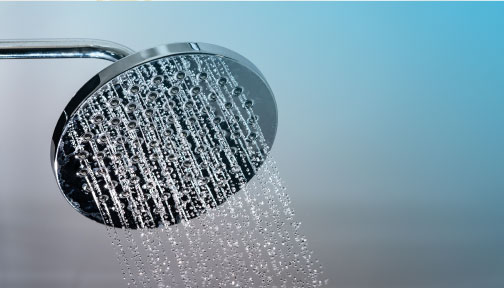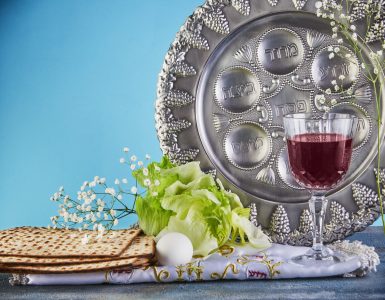The Shulchan Aruch (O.C. 613) rules:
It is forbidden to wash on Yom Kippur whether with hot or cold [water], and even extending one’s finger into water is forbidden. However, if a person’s hands or feet or the rest of his body are dirty with mud or feces or if blood dripped from his nose, it is permissible to wash them, because they only prohibited washing for pleasure…
If a person urinates and wipes [off urine droplets] with his hands, or if he defecates and wipes himself, he is permitted to wash since his hands are dirty. (Rema: And he washes until the ends of the joints of his fingers.) If he wants to pray, even if he did not wipe himself, it is also permissible to wash until the ends of the joints of his fingers. Rema: And, similarly, a Kohen who ascends the Duchan (for Birchas Kohanim) washes his hands even though they are clean because many forms of washing that are not intended for pleasure are permissible (Hagahos Meimoni, Hilchos Yom haKipurim 2 and Maharil). Therefore, even if a person arrives from traveling and his feet are aching it is permissible to wash them (Beis Yosef citing Hagahos Meimoni and Smag, and Tur, Hilchos Tisha b’Av).
Rechitza – bathing or washing – is one of the five Inuyim of Yom Kippur. Since the essence of this prohibition is to abstain from bodily pleasure and comfort, the Shulchan Aruch limits it to pleasurable washing, and washing to remove dirt or to relieve pain is not prohibited. The Poskim argue as to whether it is permitted to wash to remove perspiration:
- The Taz forbids it and rules that just as Sicha is forbidden on Yom Kippur even when the intention is to remove perspiration (614:1), so too is washing for that purpose.
- The Magen Avraham permits it. He distinguishes between Sicha, which is considered objectively pleasurable irrespective of intent, and Rechitza, which is only considered pleasurable if the intention is to derive pleasure.
The Mishna Berura rules that unless one is extremely sensitive and greatly perturbed by perspiration, it is proper to be stringent.
The Ma’amar Mordechai[1] suggests that the position of the Taz explains a difficult term used by the Rema. The Rema states that “many forms of washing that are not intended for pleasure are permitted”. This seems strange. Surely all forms of washing that are not intended for pleasure are permitted!? The Mishna Berura points out that the Hagahos Maimoni, the source of this Halacha, does not use the term “many”. However, if the Rema agrees with the Taz, his use of the term “many” may allude to washing off perspiration which is prohibited, despite it not being a form of washing for pleasure.
Some common examples of Rechitza that are permissible on Yom Kippur are those performed for Refua:
- A person may wash his hands upon awakening in the morning since its purpose is to remove harmful spirits that could cause harm if they come into contact with one of the body’s orifices such as the mouth, eyes, and ears (Shulchan Aruch, 4:3; Mishna Berura, ibid., 11).
- A person may wash his aching feet after a tiring walk (Rema, 4). [One might have thought that the Rema refers to washing the feet from sweat and dirt but the Mishna Berura (554:26) cites the Levush who explains that “the feet are exhausted due to the exertions of the journey. It is permissible as this is not out of pleasure, but for Refua, to strengthen them”.]
- The Mishna Berura (10) asserts that it is customary to abstain from rinsing one’s eyes on Yom Kippur for nominal medical benefit, “but it is permissible to wash for genuine medical benefit when it would not violate the prohibition of performing medical interventions on Shabbos”.
The Sha’ar haTziyun (11) cites the Machatzis haShekel[2] and Matei Efrayim[3] who explain that washing on Yom Kippur for Refua is prohibited on two counts: 1) the Isur of Rechitza on Yom Kippur, and 2) performing a medical intervention on Shabbos or Yom Tov (Shulchan Aruch 328). Washing one’s eyes can only be permitted if it 1) confers a significant medical benefit on the patient, thus not constituting “pleasure”, as in the examples above, and 2) when the patient is [at least] a Choleh sheEin Bo Sakana for whom Refua on Shabbos and Yom Tov is permissible
The Machatzis haShekel adds a fascinating explanation. On Shabbos, a person may rinse his aggravated eyes even when this does bring significant medical benefit, as long as his actions are not overtly medical and can be interpreted as normal washing (O.C. 328:20-21). In other words, the Isur of engaging in medical procedures on Shabbos and Yom Tov only applies to overtly medical procedures. If so, why don’t we rule similarly regarding YomKippur; why do we refrain from rinsing eyes unless the patient is a Choleh sheEin Bo Sakana?
He answers that on Yom Kippur washing the face is forbidden because it is pleasurable. Therefore, somebody who is rinsing his eyes on Yom Kippur must be washing himself for medical purposes; by definition, any washing on Yom Kippur is overtly medical! Therefore, only a Choleh sheEin Bo Sakana, for whom this prohibition is waived, may rinse his eyes on Yom Kippur.
In light of the above, it is permissible to wash a bedridden patient to prevent pressure sores from developing, even without considering that ulcers can cause life-threatening complications.
The Poskim discuss an interesting question about Netilas Yadayim before eating bread on Yom Kippur. Should patients who are Halachically required to eat on Yom Kippur wash before eating bread?
At first glance, this seems analogous to the Rema’s ruling permitting a Kohen to wash his hands before reciting the Birkas Kohanim. Both Netilas Yadayim and the washing of the Kohanim are ritual acts and not performed for pleasure. This was the conclusion of Rav Shlomo Zalman Auerbach zt”l. However, the Maharil Diskin[4] (Shu”t Kuntres Acharon 68) is unsure. He states that “further examination is required to determine whether a sick person who eats on Yom Kippur washes his hands, or whether he should eat without washing his hands”.
The Levush Mordechai[5] (Shu”t Y.D., Tinyana, 11) in a Teshuva to the Yad Sofer[6], wrote that he agreed that there seemed to be no room for the Maharil Diskin’s uncertainty. The purpose of Netilas Yadayim is to fulfill the command of Chaza”l, not to derive any pleasure. It is therefore permissible on Yom Kippur for those who need to eat.
The Levush Mordechai further supports the Yad Sofer’s lenient position by arguing that by permitting bedridden patients to rinse their eyes for medical benefit, Chaza”l were simultaneously permitting them to wash their hands. After all, it is impossible to wash the eyes without wetting one’s hands in water! He further suggests that once Chaza”l permitted Cholim to wash their hands under these circumstances, they waived the prohibition for Cholim to wash their hands altogether.
He brings further evidence from the Gemara in Chulin (107b):
They raised the question: One who feeds another person – must he wash his hands? … “Rabban Shimon ben Gamliel says: A woman may rinse one hand in water [on Yom Kippur] and give bread to her young son. They said about Shamai haZaken that he did not want to feed his children with one hand, but they decreed upon him that he must feed them with two hands. Abaye said: There [the washing was] because of [the spirit] Shivta.
The Gemara’s question is whether Chaza”l only require a person who eats bread to wash his hands, or also a person whose hands contact bread while feeding another. It attempts to resolve this question from the fact that Rabban Shimon ben Gamliel permitted a mother to wash one hand on Yom Kippur before feeding bread to a minor. Shamai haZaken – who attempted to abstain from this practice and thereby threatened his children’s wellbeing – was required by the Chachamim to wash both of his hands to publicize that hand washing is permissible in these circumstances. The Gemara reasons that if Rabban Shimon ben Gamliel permitted washing one hand before feeding somebody bread on Yom Kippur, a person must be obligated to wash his hands all year round before feeding bread to others.
However, Abaye rejects the proof. Perhaps Rabban Shimon ben Gamliel and Shamai haZaken were referring to washing one’s hands in the morning before touching food, to remove the harmful Shivta spirit that rests on the hands during nighttime sleep. Netilas Yadayim, however, may not be required when feeding others [assuming that the individual washed his hands upon awakening].
The Levush Mordechai maintains that this Gemara conclusively proves that a person who eats bread on Yom Kippur must wash his hands before eating. After all, we cannot say that somebody who feeds bread to somebody else on Yom Kippur must wash his hands but when he feeds himself it is forbidden to do so!
However, the She’arim haMetzuyanim b’Halacha[7] (124, Kuntres Acharon 2) rules that it is proper for somebody who must eat on Yom Kippur to abstain from eating bread to avoid Netilas Yadayim.
It is justified to be Machmir in this matter because the Maharil Diskin rules stringently. However, the evidence provided by the Levush Mordechai seems clear. The Gemara clearly indicates that there is no problem with performing Netilas Yadayim on Yom Kippur before feeding bread to another, and, by extension, before eating bread. (It is unreasonable to suggest that the Gemara was specifically referring to a minor who had nothing to eat besides bread, since if there were other foods available why were Shamai haZaken’s children at risk of starvation? They could have abstained from bread and eaten the other foods!?)
Rav Shmuel Wosner zt”l (Shevet haLevi 8:139) rules like the Levush Mordechai, and writes that anyone who must eat bread on Yom Kippur should wash Netilas Yadayim as usual.
[1] R’ Mordechai Karmi (Crémieux) zt”l of Aix, Provence (1749-1825)
[2] R’ Shmuel ben Nosson haLevi Loew zt”l (c. 1720–1806), Av Beis Din of Boskowitz in the South Moravian Region of the Czech Republic.
[3] R’ Efraim Zalman Margolies of Brody zt”l (c. 1760-1828), author of many Sefarim, including the Mateh Efraim which is considered the authoritative Halachic work on Elul and the Yamim Noraim.
[4] R’ Yehoshua Leib Diskin zt”l (1818-1898), Rav in Brisk before moving to Eretz Yisrael in 1878.
[5] R’ Moshe Mordechai Epstein zt”l (1866-1933), Rosh Yeshiva of Knesses Yisrael in Slabodka and (later) Chevron.
[6] R’ Moshe b. Shimon Sofer of Erlau Hy”d (1885-1944), grandson of the Chasam Sofer and a leader of Hungarian Jewry.
[7] R’ Shlomo Zalman Braun zt”l (1913-1995), Rav of Kehillas Shaarei Tzion in New York.
.















Add comment